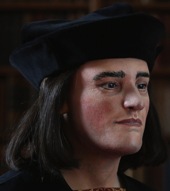 An article in a recent issue of the BBC History Magazine deals with a new book by David Hipshot called Richard III and the Death of Chivalry, published by History Press.
An article in a recent issue of the BBC History Magazine deals with a new book by David Hipshot called Richard III and the Death of Chivalry, published by History Press.
For those of you who believe that Henry Tudor had something to do with it, or even the lack of a mount for a suddenly horseless Richard, you might like to think again.
After a vivid description of Richard galloping into battle, his crown on his helmet, flags flying and accompanied by a band of faithful friends, we are given a picture of Lord Thomas Stanley and his brother William lurking on the sidelines instead of joining in the battle as good Yorkist supporters.
But just after Richard slew Tudor’s standard bearer and was pretty close to dealing with the upstart himself, the brothers Stanley and their forces charged at the Yorkist army from the rear in a heinous act of betrayal and hacked King Richard to death.
Why? Well, it wasn’t just because Stanley believed that Richard had done in his nephews and that the rest of the country was reeling in horror at the thought, nor was it because Thomas Stanley was married to Lady Margaret Beaufort, the mother of Henry Tudor. (Surprisingly this fact is not mentioned in the article.)
The real reason – maybe – was unearthed in some manuscripts in the duchy of Lancaster records. They reveal that for years there had been a massive struggle for power in north Wales, Cheshire and west Lancashire between the Stanleys and a family called the Harringtons.
Thomas Harrington and his elder son John, supporters of Richard Duke of York were both killed at the battle of Wakefield in 1460, the heirs being John’s two young daughters whose future husbands would gain control of the castle and lands the Stanleys coveted.
The ever-opportunistic Thomas claimed the girls as his wards, planning to marry them to his only son and a nephew. But James, a younger son of the Harringtons, announced that his brother died before his father at Wakefield, and therefore he was the rightful heir, not John’s daughters.
The clash between the two families continued for years, and the situation was not helped by Richard’s involvement as Lord of the North and quite naturally favouring his father’s supporters. His power extended to rewards for Harrington relatives such as the Dacres, Huddlestons, Pilkingtons, Ratcliffes and Parrs. The reduction of Stanley’s influence in the north-west of England was immense, on a par with the relegation of the Percys of Northumberland.
At Bosworth Field on August 22 1485 their revenge was sweet. Richard’s friends such as Harrington died with him along with the loyalty and trust that they treasured.
The title of the book also includes the matter of chivalry, something that we know Richard counted as being of great importance. He only knew his father for a short time, but the paternal influence remained after Wakefield. Richard was chosen to escort his father’s body from Wakefield to the family home at Fotheringay for a solemn ceremony of reburial, and endowed Queen’s College, Cambridge, with the means to pray for the soul of “the high and mighty prince of blessed memory, Richard, duke of Yorke”. It was after his father’s death that Richard and his family had retreated to the welcoming court of Philip the Good of Burgundy, where etiquette and chivalry were paramount. The memory of what he learned there must have influenced his decision on his motto: Loyaulte Me Lie. Such a sentiment was part of the Harrington thinking – but obviously not of the Stanleys.
To read more about the Harringtons, the Stanleys and David Hipshon’s book click here.
Tags: Bosworth, Richard III

Leave a reply